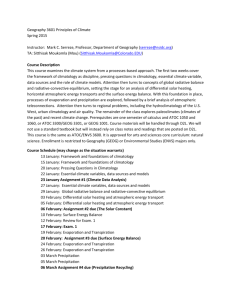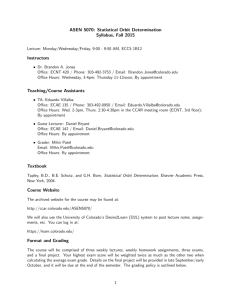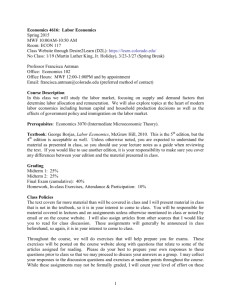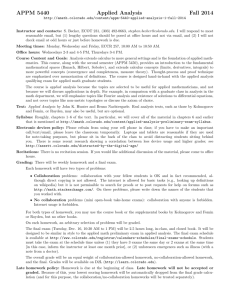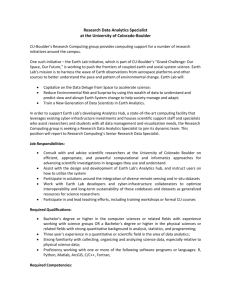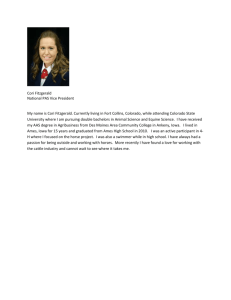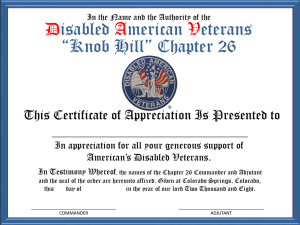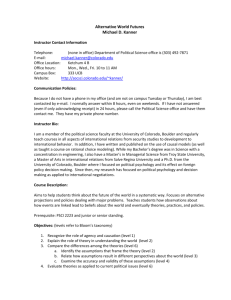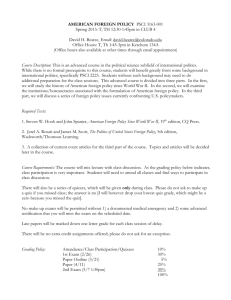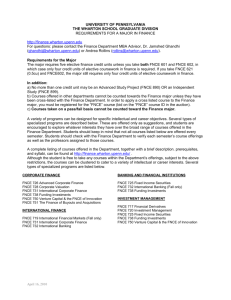FNCE 4040 - Derivative Securities
advertisement
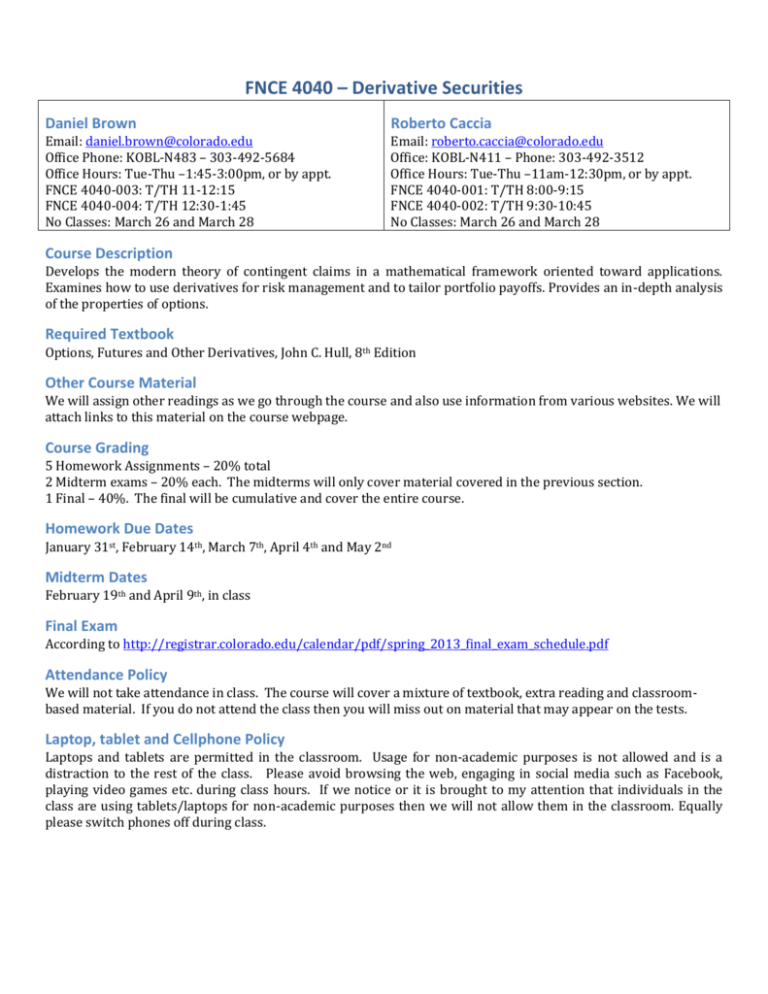
FNCE 4040 – Derivative Securities Daniel Brown Roberto Caccia Email: daniel.brown@colorado.edu Office Phone: KOBL-N483 – 303-492-5684 Office Hours: Tue-Thu –1:45-3:00pm, or by appt. FNCE 4040-003: T/TH 11-12:15 FNCE 4040-004: T/TH 12:30-1:45 No Classes: March 26 and March 28 Email: roberto.caccia@colorado.edu Office: KOBL-N411 – Phone: 303-492-3512 Office Hours: Tue-Thu –11am-12:30pm, or by appt. FNCE 4040-001: T/TH 8:00-9:15 FNCE 4040-002: T/TH 9:30-10:45 No Classes: March 26 and March 28 Course Description Develops the modern theory of contingent claims in a mathematical framework oriented toward applications. Examines how to use derivatives for risk management and to tailor portfolio payoffs. Provides an in-depth analysis of the properties of options. Required Textbook Options, Futures and Other Derivatives, John C. Hull, 8th Edition Other Course Material We will assign other readings as we go through the course and also use information from various websites. We will attach links to this material on the course webpage. Course Grading 5 Homework Assignments – 20% total 2 Midterm exams – 20% each. The midterms will only cover material covered in the previous section. 1 Final – 40%. The final will be cumulative and cover the entire course. Homework Due Dates January 31st, February 14th, March 7th, April 4th and May 2nd Midterm Dates February 19th and April 9th, in class Final Exam According to http://registrar.colorado.edu/calendar/pdf/spring_2013_final_exam_schedule.pdf Attendance Policy We will not take attendance in class. The course will cover a mixture of textbook, extra reading and classroombased material. If you do not attend the class then you will miss out on material that may appear on the tests. Laptop, tablet and Cellphone Policy Laptops and tablets are permitted in the classroom. Usage for non-academic purposes is not allowed and is a distraction to the rest of the class. Please avoid browsing the web, engaging in social media such as Facebook, playing video games etc. during class hours. If we notice or it is brought to my attention that individuals in the class are using tablets/laptops for non-academic purposes then we will not allow them in the classroom. Equally please switch phones off during class. Course Topics 1. Introduction 2. Futures and Forwards a. Players, Market Place, Contract Mechanics b. Pricing c. Hedging 3. Swaps 4. Options a. Players, Market Place, Contract Mechanics b. No-Arbitrage Relationships c. Trading Strategies d. Binomial Pricing e. Models of Stock Returns f. Black-Scholes Pricing g. Beyond Black-Scholes h. The Greeks i. Corporate Hedging j. Monte Carlo Pricing 5. Risk Management a. Value at Risk b. Estimating Volatilities c. Credit Risk Statements required or recommended by the Office of Undergraduate Education If you qualify for accommodations because of a disability, please submit to your professor a letter from Disability Services in a timely manner (for exam accommodations provide your letter at least one week prior to the exam) so that your needs can be addressed. Disability Services determines accommodations based on documented disabilities. Contact Disability Services at 303-492-8671 or by e-mail at mailto:dsinfo@colorado.edu. If you have a temporary medical condition or injury, see Temporary Injuries under Quick Links at Disability Services website (http://disabilityservices.colorado.edu/) and discuss your needs with your professor. Campus policy regarding religious observances requires that faculty make every effort to deal reasonably and fairly with all students who, because of religious obligations, have conflicts with scheduled exams, assignments or required attendance. Please call to my attention any religious observances that will conflict with assigned work, including, but not limited to, scheduled exams within the first two weeks of the semester. See full details at http://www.colorado.edu/policies/fac_relig.html Students and faculty each have responsibility for maintaining an appropriate learning environment. Those who fail to adhere to such behavioral standards may be subject to discipline. Professional courtesy and sensitivity are especially important with respect to individuals and topics dealing with differences of race, color, culture, religion, creed, politics, veteran’s status, sexual orientation, gender, gender identity and gender expression, age, disability, and nationalities. Class rosters are provided to the instructor with the student's legal name. I will gladly honor your request to address you by an alternate name or gender pronoun. Please advise me of this preference early in the semester so that I may make appropriate changes to my records. See policies at http://www.colorado.edu/policies/classbehavior.html and at http://www.colorado.edu/studentaffairs/judicialaffairs/code.html#student_code The University of Colorado Boulder (CU-Boulder) is committed to maintaining a positive learning, working, and living environment. The University of Colorado does not discriminate on the basis of race, color, national origin, sex, age, disability, creed, religion, sexual orientation, or veteran status in admission and access to, and treatment and employment in, its educational programs and activities. (Regent Law, Article 10, amended 11/8/2001). CU-Boulder will not tolerate acts of discrimination or harassment based upon Protected Classes or related retaliation against or by any employee or student. For purposes of this CU-Boulder policy, "Protected Classes" refers to race, color, national origin, sex, pregnancy, age, disability, creed, religion, sexual orientation, gender identity, gender expression, or veteran status. Individuals who believe they have been discriminated against should contact the Office of Discrimination and Harassment (ODH) at 303-492-2127 or the Office of Student Conduct (OSC) at 303-492-5550. Information about the ODH, the above referenced policies, and the campus resources available to assist individuals regarding discrimination or harassment can be obtained at http://hr.colorado.edu/dh/ All students of the University of Colorado at Boulder are responsible for knowing and adhering to the academic integrity policy of this institution. Violations of this policy may include: cheating, plagiarism, aid of academic dishonesty, fabrication, lying, bribery, and threatening behavior. All incidents of academic misconduct shall be reported to the Honor Code Council (mailto:honor@colorado.edu; 303-735-2273). Students who are found to be in violation of the academic integrity policy will be subject to both academic sanctions from the faculty member and non-academic sanctions (including but not limited to university probation, suspension, or expulsion). Other information on the Honor Code can be found at http://www.colorado.edu/policies/honor.html and at http://honorcode.colorado.edu
